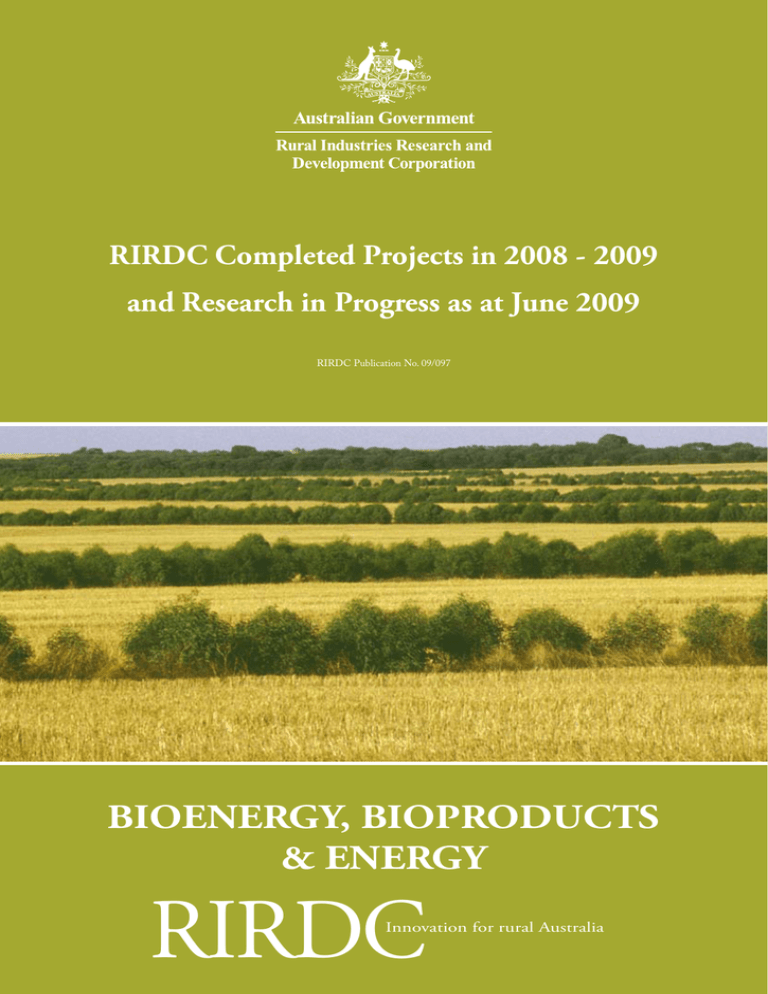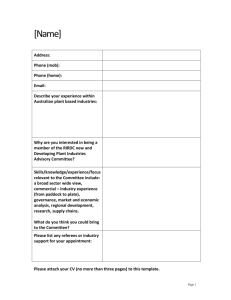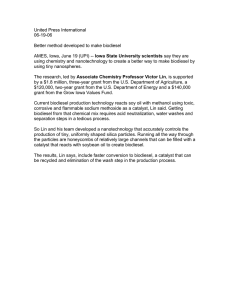
RIRDC Completed Projects in 2008 - 2009
and Research in Progress as at June 2009
RIRDC Publication No. 09/097
BIOENERGY, BIOPRODUCTS
& ENERGY
RIRDC
Innovation for rural Australia
BIOENERGY, BIOPRODUCTS
& ENERGY
RIRDC Completed Projects in 2008- 2009
and Research in Progress as at June 2009
August 2009
RIRDC Publication No 09/097
© 2009 Rural Industries Research and Development Corporation.
All rights reserved.
ISBN 1 74151 896 2
ISSN 1440-6845
RIRDC R&D Projects completed in 2008-09 and Research in Progress as at June 2009 – Bioenergy,
Bioproducts & Energy
Publication No 09/097
The information contained in this publication is intended for general use to assist public knowledge and discussion
and to help improve the development of sustainable regions. You must not rely on any information contained in
this publication without taking specialist advice relevant to your particular circumstances.
While reasonable care has been taken in preparing this publication to ensure that information is true and correct,
the Commonwealth of Australia gives no assurance as to the accuracy of any information in this publication.
The Commonwealth of Australia, the Rural Industries Research and Development Corporation (RIRDC), the
authors or contributors expressly disclaim, to the maximum extent permitted by law, all responsibility and liability
to any person, arising directly or indirectly from any act or omission, or for any consequences of any such act or
omission, made in reliance on the contents of this publication, whether or not caused by any negligence on the
part of the Commonwealth of Australia, RIRDC, the authors or contributors.
The Commonwealth of Australia does not necessarily endorse the views in this publication.
This publication is copyright. Apart from any use as permitted under the Copyright Act 1968, all other rights are
reserved. However, wide dissemination is encouraged. Requests and inquiries concerning reproduction and rights
should be addressed to the RIRDC Publications Manager on phone 02 6271 4165.
RIRDC Bioenergy, Bioproducts & Energy (BBE) Research Manager
Roslyn Prinsley
Rural Industries Research and Development Corporation
Level 2, 15 National Circuit
BARTON ACT 2600
PO Box 4776
KINGSTON ACT 2604
Phone: (02) 6271 4120
Fax:
(02 6271 4199
Email: roslyn.prinsley@rirdc.gov.au
In submitting this report, the researcher has agreed to RIRDC publishing this material in its edited form.
RIRDC Contact Details
Rural Industries Research and Development Corporation
Level 2, 15 National Circuit
BARTON ACT 2600
PO Box 4776
KINGSTON ACT 2604
Phone:
Fax:
Email:
Website:
(02) 6271 4100
(02) 6271 4199
rirdc@rirdc.gov.au
http://www.rirdc.gov.au
Electronically published by RIRDC in August 2009
Print-on-demand by Union Offset Printing, Canberra at www.rirdc.gov.au
or phone 1300 634 313
ii
Foreword
RIRDC produces Research in Progress summaries of continuing projects and those completed
during 2008-2009. Our intention is to:
•
•
give stakeholders early access to the results of ongoing and completed work to inform
their decisions, and
to inform researchers of results to shape research directions.
The complete report on all programs is on our website at http://www.rirdc.gov.au
The objectives of the Bioenergy, Bioproducts & Energy Program are:
•
•
To meet Australia’s research and development needs for the development of sustainable and
profitable bioenergy and bioproducts industries.
To develop an energy cross-sectoral R&D plan following the development of a nationally
coordinated R&D plan for Bioenergy and Biofuels, under the Primary Industries Standing
Committee R&D Framework.
This report is an addition to RIRDC’s diverse range of over 1800 research publications, which
are available for viewing, downloading or purchasing online through our website:
www.rirdc.gov.au. Purchases can also be made by phoning 1300 634 313.
Peter O’Brien
Managing Director
Rural Industries Research and Development Corporation
iii
Contents
1.1 BIOENERGY, BIOPRODUCTS & ENERGY – COMPLETED PROJECTS
PROJECT
No
PROJECT TITLE
Develop sustainability guidelines
PRJ-003196 Identifying and developing
Australian native species as
biofuel crops
RESEARCHER
PHONE
ORGANISATION
Robert Henry
(02) 6620 3010 Southern Cross
University
PAGE
No
1
1.2 BIOENERGY, BIOPRODUCTS & ENERGY – RESEARCH IN PROGRESS
PROJECT
No
PROJECT TITLE
Develop sustainability guidelines
PRJ-002696 Demonstration of market
delivery of biodiesel from
Indian mustard in NW NSW
PRJ-002408 Evaluating biodiesel potential
of Australian native plants
PRJ-000070 Commercial potential of giant
reed for pulp/paper and biofuel
production
RESEARCHER
PHONE
Richard
Trethowan
(02) 9351 8860 The University of
Sydney
2
Nanjappa
Ashwath
Christopher
Williams
(07) 4930 9595 Central Queensland
University
(08) 8303 9567 The Minister for
Agriculture, Food &
Fisheries acting
through South
Australian Research
& Development
Institute
(02) 6242 1573 CSIRO
3
PRJ-002601 Sustainability framework for
Deborah
biobased products in Australia O'Connell
iv
ORGANISATION
PAGE
No
4
5
Completed Projects - BBE – Develop Sustainability Guidelines
Project Title
Identifying and developing Australian native species as
biofuel crops
PRJ-003196
RIRDC Project No.:
Start Date:
Finish Date:
Researcher:
Organisation:
Phone:
Fax:
Email:
13/06/2008
25/02/2009
Robert Henry
Southern Cross University
02 6620 3010
02 6622 2080
robert.henry@scu.edu.au
Objectives
The overall objectives of this project are: 1. report on existing knowledge of
Australian species which show potential 2. report on species suitability in
relation to overall positive net energy return 3. identify potential species which
will not compete with existing agricultural systems for resources 4. identify
knowledge gaps thereby assisting to define future research 5. define criteria for
the selection of species that produce suitable biomass.
Background
Australian native species have advantages of being readily adaptable to more
marginal growing areas thereby not directly competing with production of
conventional crops or livestock. Australia is a large continent with many
different climatic zones and as a result the native flora is diverse. The
Australian flora thereby presents an opportunity to identify species which are
suitable and adaptable to production as ‘second generation’ biofuels.
Research
Research into the potential of Australian native species to serve as feedstock is
important in an attempt to reduce carbon emissions and technologies with
inherent low if not zero carbon footprints utilising non-food sources. The
workshop was able to focus on how additional research could extend current
research activities.
Outcomes
The workshop identified the following key research needs:
• Analysis of the performance of candidate species in a range of Australian
environments to allow species selection. Options for Northern Australia were
emphasised to complement previous work of Florasearch in southern Australia.
• Analysis of the biomass composition of candidate species to evaluate
suitability for different conversion technologies
• Life cycle analysis of native species systems as being conducted by CSIRO
• Supply chain issues associated with native species production including
propagation issues.
Implications
Publications
1
Research in Progress - BBE – Develop Sustainability Guidelines
Project Title
Demonstration of market delivery of biodiesel from Indian
mustard in NW NSW
PRJ-002696
RIRDC Project No.:
Start Date:
Finish Date:
Researcher:
Organisation:
Phone:
Fax:
Email:
Objectives
30/05/2008
30/05/2010
Richard Trethowan
The University of Sydney
(02) 9351 8860
(02) 9351 8875
rtrethowan@camden.usyd.edu.au
The project will have three objectives: 1) the genetic improvement of mustard
for biodiesel production 2) establishment of the feasibility of producing
biodiesel from locally grown mustard in northern NSW and 3) evaluation of the
model of regional biodiesel self-sufficiency using the PBI research station
located at Narrabri as a pilot case.
Current Progress
1. Genetic improvement of mustard for biodiesel production.
Yield trials of elite lines identified in the 2008 season have been sown at
multiple sites in northwestern NSW. Seed increases have been sown
concurrently to facilitate seed commercialization once an elite line(s) has been
identified on the basis of high stable yield and oil production.
2. Establishment of the viability of mustard for biodiesel production
Conformance to Australian biodiesel standards is currently being evaluated on
both oil and biodiesel produced from contrasting mustard genotypes. Regional
yield trials in 2009 will provide critical information on grain yield, biodiesel
yield, production costs and additional benefits accrued from planting mustards
in rotation with cereals.
3. Test the model of regional sustainability using PBI as a test case.
An additional biodiesel plant has been established at PBI Narrabri. One plant
will continue to produce micro-biodiesel samples and the other bulk samples for
running farm machinery. Simple diesel engines (such as threshing machines)
have been successfully run on locally produced biodiesel. Tractors and more
sophisticated machinery will be tested with biodiesel once Australian Industry
Standard conformance has been established. Mustard has been sown in the PBI
farm rotation to produce samples for bulk biodiesel production.
2
Research in Progress - BBE – Develop Sustainability Guidelines
Project Title
Evaluating biodiesel potential of Australian native plants
PRJ-002408
RIRDC Project No.:
Start Date:
Finish Date:
Researcher:
Organisation:
Phone:
Fax:
Email:
Objectives
20/05/2008
31/12/2009
Nanjappa Ashwath
Central Queensland University
07 4930 9595
07 4930 9255
n.ashwath@cqu.edu.au
(a) Identification of potential native species that can produce appreciable
amounts of raw materials for biodiesel production, and grow well on degraded
and grazing lands of central Queensland. (b) Testing the seeds for oil content,
and the oil for its biodiesel production, with a preliminary assessment of the use
of by-products as animal feed or organic amendment for crop production. (c)
Economic analysis of biodiesel production from native species grown on
degraded lands of central Queensland.
Current Progress
(a) More than 100 species have been selected as having a potential for
establishment on degraded lands of central Queensland, and able to produce
appreciable amounts of seeds. Seeds of about 90 species have been procured
and this process is still continuing as we have received the approval to continue
the project until the end of 2009.
(b) Until now, a total of 70 species have been tested for oil content. Of these, 43
species contained less than 10% oil and they are regarded as having little
biodiesel potential. There were 10 species that had 10-20% oil, whereas 17
other species had >20% oil. The species that had >20% oil include timber
species such as Elaeocapus grandis, Aleurites moluccana, under-exploited
species like Calophyllum inophyllum, Pongamia pinnata and queen palm, an
environmental weed like Ochna sp. and some other native species for which
very little information is currently available. The study has focussed more on
exploring seed oil content than other aspects. Procedures of converting the oil
into biodiesel have been finalised, and the cake derived from these species has
been collected and stored for further assessment. Only those species having
>20% oil will be tested for biodiesel properties.
(c) Data on fruit or seed production, the ease at which oil can be extracted, and
the complications involved in converting the oil into biodiesel are being
recorded so that the economic potential of using some of the tested species can
be determined before the conclusion of the project.
3
Research in Progress - BBE – Develop Sustainability Guidelines
Project Title
Commercial potential of giant reed for pulp/paper and biofuel
production
PRJ-000070
RIRDC Project No.:
Start Date:
Finish Date:
Researcher:
Organisation:
Phone:
Fax:
Email:
Objectives
30/10/2007
30/12/2009
Christopher Williams
The Minister for Agriculture, Food & Fisheries acting through South Australian
Research & Development Institute
(08) 8303 9567
(08) 8303 9424
williams.chris3@saugov.sa.gov.au
This project will provide indicative data on the commercial potential of the new
biomass grass, Arundo donax (Adx) as a renewable, non food source of
extremely high biomass yield for pulp/fibre/paper, or biofuels grown on
marginal and arable soils.
In this project, the weed risk assessment of Arundo donax and preparation of a
weed risk management guidelines handbook (work with Dr John Virtue, Weeds
CRC) will resolve where Adx can be grown in sustainable systems. Also data
will be collected to estimate the ability of Arundo donax to treat wastewaters on
marginal lands for resource recycling compared with other conventional crop
feedstock sources.
This project will develop a new, non food crop, Adx, options for farmers and
industry with multiple potential benefits, renewable fibre or energy feedstocks,
within the framework of economic systems and systems which use non food
crops on marginal lands with often marginal wastewater reuse systems.
Current Progress
Evaluation of Arundo donax (Adx, giant reed) in three field trials has been
successfully continued in the final year for this project. High biomass yields of
45 and 35 tonnes of dry tops per hectare per year (in 2007 and 2008,
respectively) were recorded in industrial biosystems being developed for Adx
grown under irrigated saline conditions on marginal land at Barmera, SA.
Biomass samples have been sent to Prof. Rogers, UNSW for ethanol
conversion, Best Energies for pyrolysis to biochar and to Dr Rainey, QUT, for
pulp/paper tests. Dr Virtue and team (Dept. Water Land & Biodiversity
Conservation) are analysing the weed risk of Adx using the SA Weed Risk
Management System.
Separate assessments are being undertaken for riparian (and flood prone) and
non-riparian ecosystems, which is expected to show a considerable difference in
weed risk. Given that we have shown Adx does not produce viable seed, routine
containment of its vegetative spread in non-riparian ecosystems should be
feasible. This would be achieved by appropriate geographic placement of
plantations (well away from flood prone riparian areas) and through crop
hygiene practices to prevent spread.
Project work is on schedule and the final report will be submitted by 30
December 2009.
4
Research in Progress - BBE – Develop Sustainability Guidelines
Project Title
Sustainability framework for biobased products in Australia
PRJ-002601
RIRDC Project No.:
Start Date:
Finish Date:
Researcher:
Organisation:
Phone:
Fax:
Email:
Objectives
23/06/2008
1/07/2009
Deborah O'Connell
CSIRO
(02) 6242 1573
deborah.o'connell@csiro.au
The key aim of the project is to: (i) produce a review paper on national and
international development in the approaches to sustainability of biofuels,
bioenergy and biobased products; (ii) identify and list relevant Australian
government policies; and (iii) identify pathways to adoption of future
sustainability guidelines for biofuels and bioenergy.
Current Progress
Since the last report (RIRDC Annual Progress Report 30/11/2008), the full
writing team of Deborah O’Connell (CSIRO); John Raison (CSIRO); Andrew
Braid (CSIRO); Annette Cowie (NSW DPI); Brendan George (NSW DPI);
Kristian Handberg (Vic DSE) and Luis Rodriguez (CSIRO) have met face-toface, and there have been regular meetings of the CSIRO group. Six of the nine
chapters and three appendices of the Sustainability Framework report have been
drafted.
All of the relevant international literature has been identified and reviewed more
than once as international activities in this area are rapidly progressing. On the
20/03/2009, a draft copy of the Sustainability Framework report was circulated
to the Steering Committee - Roslyn Prinsley, Steve Schuck, Mark Glover, Bruce
Harrison and Dr Elizabeth Brierley, Assistant Director, Fuel and Used Oil
Policy, DEWHA who has been added to the Steering Committee. All responses
have been considered and incorporated into the document.
5
BIOENERGY, BIOPRODUCTS
& ENERGY
RIRDC Publication No. INSERT PUB NO. HERE
RIRDC Publication No. 09/097
Bioenergy, Bioproducts & Energy Research in Progress, June
2009, contains short summaries of continuing projects as
well as those that were completed during 2008-2009. The
objectives of the Bioenergy, Bioproducts & Energy Program
are:
•To meet Australia’s research and development needs for the development of sustainable and profitable bioenergy and bioproducts industries
The Rural Industries Research and Development Corporation
(RIRDC) manages and funds priority research and translates
results into practical outcomes for industry.
Our business is about developing a more profitable, dynamic
and sustainable rural sector. Most of the information we
produce can be downloaded for free or purchased from our
website: www.rirdc.gov.au, or by phoning 1300 634 313 (local
call charge applies).
•To develop an energy cross-sectoral R&D plan following the development of a nationally coordinated R&D plan for Bioenergy and Biofuels, under the Primary Industries Standing Committee R&D Framework.
Contact RIRDC:
Level 2
15 National Circuit
Barton ACT 2600
Most RIRDC books can be freely downloaded or
purchased from www.rirdc.gov.au or by phoning
1300 634 313 (local call charge applies).
PO Box 4776
Kingston ACT 2604
www.rirdc.gov.au
Ph: 02 6271 4100
Fax: 02 6271 4199
Email: rirdc@rirdc.gov.au
web: www.rirdc.gov.au
RIRDC
Innovation for rural Australia




